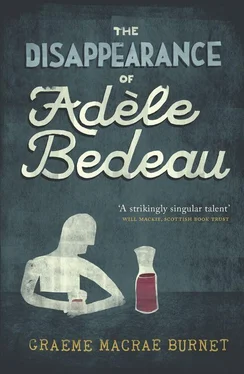Manfred poured himself more wine. The man with the paper got up and left, bidding a cursory goodbye to the proprietor. Manfred was surprised that he did not feel more self-conscious. Normally in such a situation he craved some reading material in which to bury his head and avoid eye contact. A newspaper made one invisible. He thought about his grandfather’s nickname, how as a teenager he had skulked around the shadows of the house, sometimes taking off his shoes to avoid disturbing his grandparents. He had always felt like an imposter in their home and sought to avoid reminding them of his presence. And hadn’t he even now, in this bar, taken an inconspicuous table by the wall? When he arrived at work it took a supreme effort for him to walk in boldly, in a manner befitting his status as ‘the boss’ and greet his staff in an audible voice. Every morning he breathed a minor sigh of relief as he slipped onto the leather chair behind his desk.
Yet, Manfred reflected, he felt a rare sense of comfort in this slightly rancid smelling bar where no one knew him. He felt like a man, entitled to stop where he wanted and drink a carafe of wine, alone, at four o’clock on a weekday afternoon. The proprietor cleared the glass and water jug from the nearby table, then unhurriedly wiped it down. He did not so much as glance in Manfred’s direction.
Manfred finished his wine, but he did not feel like leaving. He felt like he was abroad. He raised his hand to the proprietor and ordered a second carafe. To hell with the Restaurant de la Cloche. Pasteur would have to do without his money tonight. And the rest of them? Let them gossip all they liked. If they had nothing better to talk about, that was their problem.
The second carafe arrived and Manfred got stuck in. Things had to change. He was in a rut, but now was time to get out of it. For years he had told himself that there was nothing he could do about his situation, that circumstances, his temperament, dictated how he behaved. But he had been deceiving himself. There was nothing to prevent him doing anything he wanted. He could easily apply to the bank for a transfer to another city, to a place where he could live unencumbered by the weight of his past, a place where nobody called him ‘Swiss’. But why stop there? He recalled how, as a teenager, he had burned with the desire to write, how he had sat up through the night scribbling in notebooks. Why not take up writing now? Perhaps he had talent. He only had to rediscover the fire-in-the-belly of his youth. It was not even impractical. For years he had earned a good salary and spent no more than he needed. His savings were substantial, more than enough to fund himself as a writer for years. Manfred became oblivious to his surroundings. In his reverie he saw himself sitting in front of a typewriter at the open window of an atelier in Paris, strolling along a cobbled street in Montmartre in bohemian clothes, notebook in hand, casually greeting the whores and tradesmen of the district. Was there really anything to stop him? He was brought back to earth by a familiar voice. Lemerre was standing by his table.
‘Slumming it a little, aren’t you, Swiss?’ he said with characteristic hostility.
Manfred felt disorientated, as if he had been abruptly woken from a deep sleep. Before he had time to tell himself that he had no need to excuse his presence in the bar to Lemerre, he began to feel his way towards an explanation.
‘I… I sometimes pop in here for a quick one after work.’ He regretted the lie as soon as he had said it.
Lemerre weighed this up with theatrical bewilderment. He looked at the two carafes on Manfred’s table. Manfred remembered that his barber’s shop was not five minutes’ walk away.
‘Strange that I’ve never seen you in here.’ He turned to the proprietor. ‘You seen our Swiss in here before, Yves?’
The proprietor gave an almost imperceptible shake of his head, as if reluctant to provide Lemerre with the confirmation he desired.
Lemerre massaged his jowly chin and shook his head slowly, as if stumped by the puzzle and went over to the bar, where the proprietor had already placed his drink. Manfred cringed. Lemerre engaged in some coarse banter with the men at the bar. Then he lowered his voice and the men turned in unison to look at Manfred, before he muttered something else and they all burst into laughter. Manfred felt the colour rise in his cheeks. He wanted to jump up and run out into the street, but he hadn’t paid for his drinks and doing so would entail either going over to the counter or summoning the proprietor, both of which were out of the question.
Lemerre downed his drink swiftly and left without another word to Manfred.
Manfred suddenly felt the gloomy effect of the wine. His head swam. The bar had fallen silent. The regulars had suddenly run out of topics of conversation, or perhaps felt self-conscious on account of the previously unnoticed stranger in their midst. The place was tainted now. He was no longer a nobody, but somebody who had been observed and whose behaviour was being noted. His carafe was two-thirds full. He would look ridiculous if, having ordered it only minutes before, he got up and left. He refilled his glass and forced himself to drink. He tried to return to his daydream about escaping Saint-Louis, but the idea that he had even for a moment entertained the thought of running off and becoming a writer was ludicrous. And all the more so with Gorski sniffing around. Manfred drained his glass as if making a private toast to the death of his dream.
There were more pressing issues with which to occupy his thoughts. Gorski had already questioned Lemerre and his cohorts and might well do so again. Already Manfred had broken his golden rule and failed to follow his routine. And now that Lemerre had caught him red-handed, it was bound to come to Gorski’s attention. The detective would be sure to ask why he had come to this out-of-the-way dive where one could not be seen from the street. Who was he hiding from? Why, since the disappearance of Adèle, had he been behaving in this out-of-character manner? Manfred would have no plausible explanation. Regardless of having been caught by Lemerre, it had been a mistake to come here, but he must not compound one mistake with another. He must revert to his routine and go to the Restaurant de la Cloche as usual. Manfred struggled to drink the rest of his carafe. The workmen at the counter left and for a few minutes Manfred and the proprietor were the only people in the bar. Unlike Pasteur, who could always find some task with which to occupy himself, this man — Manfred had heard Lemerre call him Yves — stood staring blankly into the space above the tables. He was stocky and unattractive, with narrow beady eyes. The fawn sports shirt he was wearing was stained with grease or mustard. He did not appear to be watching him, but Manfred felt that every movement he made was being noted. The effect of the wine was no longer pleasant. If called upon to speak, he felt that he would slur or stumble over his words. Neither man spoke. Manfred glanced at his watch as if to suggest that he had some appointment to keep. His bladder pressed against the waistband of his trousers. The WC was on the opposite side of the bar. Under the scrutiny of the barman Manfred felt it was beyond him to get up from the banquette and walk across the room. He wondered what Alice would make of the sight of him, sitting getting sozzled in this dive, incapable of walking to the WC to relieve himself. Yves unfolded his arms and exhaled loudly. Manfred wondered whether he was about to speak.
Thankfully, the door opened and two men in their twenties entered. They were talking loudly in derogatory terms about their boss. The proprietor greeted them with a single word, ‘Messieurs,’ and an upward motion of his head. The young men ordered large beers and stood at the bar. Manfred took the opportunity to leave his seat and make his way to the WC. When he returned, the two young men were crudely discussing the attributes of various females colleagues. They paid no attention to Yves and had not so much as glanced around the bar. Manfred simultaneously despised them and envied their lack of self-consciousness. Still, they formed a kind of barrier between him and the proprietor. He was no longer the centre of attention. When another older man came in and sat at a table beneath the high windows, he barely seemed to notice Manfred, before taking out his newspaper and carefully opening it on the table in front of him.
Читать дальше












